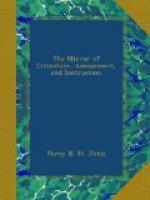“It does not appear what became of Spencer’s wife and children. Two sons are said to have survived him, Sylvanus and Peregrine; Sylvanus married Ellen Nangle or Nagle, eldest daughter of David Nangle of Moneanymy, in the county of Cork, by whom he had two sons, Edmund and William Spencer. His other son, Peregrine, also married, and had a son Hugolin, who, after the restoration of Charles II. was replaced by the Court of Claims in as much of the lands as could be found to have been his ancestor’s. Hugolin attached himself to the cause of James II. and after the revolution, was outlawed for treason and rebellion. Some time after his cousin William, son of Sylvanus, became a suitor for the forfeited property, and recovered it by the interest of Mr. Montague, afterwards Earl of Halifax, who was then at the head of the treasury. He had been introduced to Mr. Montague by Congreve, who with others was desirous of honouring the descendant of so great a poet. Dr. Birch describes him as a man somewhat advanced in years, but unable to give any account of the works of his ancestor which are wanting. The family has been since very imperfectly traced.”—Chalmers’s Biog. Dic.
The visits of Sir Walter Raleigh to Spencer at Kilcolman increase the interest attached to the place, and are not in the slightest degree questionable.[3] To the advice of Raleigh the publication of the first books of the Fairy Queen has been ascribed; and the existence of a poetical intercourse between such minds, and in such distracting scenes, is a delightful recollection that almost warms the heart into romance.
[3] Raleigh, it will be recollected,
became Spencer’s patron,
upon
the death of Sir Philip Sidney, whom he celebrates
under
the title of “The Shepherd of the Ocean.”
Raleigh also
ensured
Spencer the favour of Elizabeth, a pension of 50l.
per
annum, and the distinction of her laureate.—ED.
Amongst the literary pilgrims whose veneration for Spencer has prompted them to examine Kilcolman was the celebrated Edmund Burke; nor should the imprudent and enthusiastic Trotter be forgotten; the account given by him of his visits, in 1817, are very pleasing, though highly tinged with that fanaticism to which he ultimately became a victim.
* * * * *
THE SELECTOR; AND LITERARY NOTICES OF NEW WORKS.
* * * * *
CROTCHET CASTLE.
The author of Headlong Hall has, under the above title, produced as lively a little volume of humour and pleasantry as it has lately been our good fortune to meet with. Every page, nay, every line is a satire upon the extravagance and precocity of what Vivian Grey calls our “artificial state;” and all the weak sides of our age are mercilessly dealt with by the coterie at Crotchet Castle. The book is altogether Shandean, and the satire




